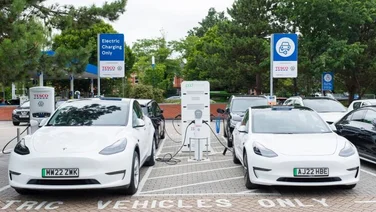We’re celebrating the new year by looking back on some of the environmental milestones of 2023 – the good, the bad and the ugly.
Here’s a quick overview of what happened in 2023:
- 2023 declared the hottest year on record
- Enough renewable energy generated to power every home in the UK
- 2023 the best year for UK domestic renewable energy installations
- Germany reached a new record for wind and power installations
- New electric vehicle sales went up by 45% in Ireland
2023 declared the hottest year on record
Starting our list off with a bit of a downer, 2023 was officially declared the hottest year on record by the European Union’s Copernicus Climate Change Service.
The average temperature in 2023 was 1.46°C higher than the late 19th century average (the pre-industrial age), and 0.13°C above the 2016 average, which was the previous hottest year.
This is a worrying trend, with the new 2023 record of 1.46°C dangerously close to the 1.5°C “safe” global warming limit set by the 2015 Paris Agreement.
Pr. Edward Hawkins is a climate scientist at the University of Reading, credited with creating warming striped graphics to visualise global warming.
Experts generally believe global warming of 2°C above the pre-industrial ages will bring us into the danger zone when it comes to natural disasters caused by climate change.
But it’s not all doom and gloom, 2023 was also a record year for renewable energy and low-carbon tech.
Enough renewable energy generated to power every home in the UK
In 2023, the UK generated enough renewable energy to power each of the country’s 28 million homes, according to research by the Energy and Climate Intelligence Unit (ECIU).
Wind, hydro, and solar installations produced over 90 terawatt hours of energy this past year, increasing by 20-25% each quarter of 2023. By contrast, gas energy generation fell by 20-30% each quarter.
This is an impressive milestone, but it’s still not enough energy to meet the country’s industrial and commercial needs.
The UK’s share of renewable electricity is still hovering around 40% of the total. By contrast, in Portugal 61% of electricity came from renewables in 2023, a new record.
The energy sector in the UK might be lagging behind a little when it comes to generating renewable energy, but UK homeowners certainly aren’t.
2023 the best year for UK domestic renewable energy installations
Domestic renewable energy installations were at a record high in 2023, according to the latest Microgeneration Certification Scheme (MCS) data.
In the top spot were solar panels, with a little over 180,000 installations carried out in 2023, a 30% increase from 2022. In second place were heat pumps, with over 35,000 installations, up from around 30,000 installations in 2022.
The somewhat high upfront costs of solar panels and heat pumps don’t seem to have deterred people from getting them, and it’s easy to see why. Solar panels can save the average household £537 on electricity bills over their lifetime, and with the Boiler Upgrade Scheme, an air source heat pump costs around as much as a gas boiler.
Globally, 2023 was a record year for renewable energy, driven by solar.

Germany reached a new record for wind and power installations
A record number of solar and wind installations were carried out in Germany in 2023, according to the latest figure from BSW Solar Power and the German Wind Energy Association (BWE).
14 gigawatt’s (GW) worth of solar power systems were installed in Germany in 2023, half of which were residential installations. That’s an impressive 85% increase from 2022.
Also in 2023, a record 6.4 GW’s worth of wind power systems were installed. This falls a little short of the German government’s goal of 10 GW installed a year, but it’s still impressive.
The government is aiming for 80% of its electricity to come from renewables by 2030 – it’s currently at around 52%.
It’s not just renewables that had a record year, electric vehicles (EVs) reached new heights of popularity.
New electric vehicle sales went up by 45% in Ireland
In other positive news, electric vehicle sales were up 45% in Ireland in 2023, compared to 2022, according to the Society of the Irish Motor Industry (SIMI).
Roughly 22,789 electric cars were registered this past year. Electric, hybrid, and plug-in vehicles now make up 45.5% of the market in Ireland.
India beat Ireland by a little. EV sales went up by 50% in 2023 – with electric motorcycles accounting for most of the growth.
It’s clear from these numbers that EVs keep gaining in popularity. Not only are they better for the environment than petrol or diesel cars, but the cost of charging an EV at home is half that of a petrol car. That’s why more and more electric car owners are installing EV home chargers.
So there you have it, 2023 wrapped. New records look set to be met in 2024, as governments ramp up their effort to reach net zero emissions.






